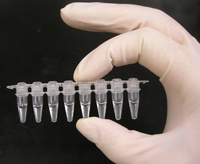
Photo from wikipedia
Objective: The standard methods for tri-allelic single nucleotide polymorphism (SNP) genotyping require special equipment and are costly to perform. The aim of this study was to establish a fast, simple,… Click to show full abstract
Objective: The standard methods for tri-allelic single nucleotide polymorphism (SNP) genotyping require special equipment and are costly to perform. The aim of this study was to establish a fast, simple, and low-cost method to differentiate among tri-allelic SNPs in general laboratories. Methods: Based on the tetra-primer amplification refractory mutation system-polymerase chain reaction (T-ARMS-PCR) typing of bi-allelic SNPs, we developed a penta-primer amplification refractory mutation system-polymerase chain reaction (P-ARMS-PCR) method characterize tri-allelic SNPs. The two most studied tri-allelic SNPs, rs2032582 and rs3091244, were genotyped using P-ARMS-PCR in 110 volunteers, and the results were verified by direct DNA sequencing. Results: For rs2032582, there were 20 samples (18.18%) with the GG genotype, 3 (2.73%) with the AA genotype, 24 (21.82%) with the TT genotype, 43 (39.09%) with the GT genotype, 11 (10.00%) with the AG genotype, and 9 (8.18%) with the AT genotype. For rs3091244, there were 67 samples (60.91%) with the CC genotype, 1 (0.91%) with the AA genotype, 8 (7.27%) with the CT genotype, 31 (28.18%) with the CA genotype, and 3 (2.73%) with the AT genotype. The genotypic distributions of rs2032582 (p = 0.482) and rs3091244 (p = 0.492) were in Hardy-Weinberg equilibrium. The DNA sequencing results were entirely consistent with the results of P-ARMS-PCR. Conclusion: P-ARMS-PCR is an accurate, rapid, simple, and low-cost characterization method for tri-allelic SNP genotyping of rs2032582 and rs3091244.
Journal Title: Genetic testing and molecular biomarkers
Year Published: 2022
Link to full text (if available)
Share on Social Media: Sign Up to like & get
recommendations!